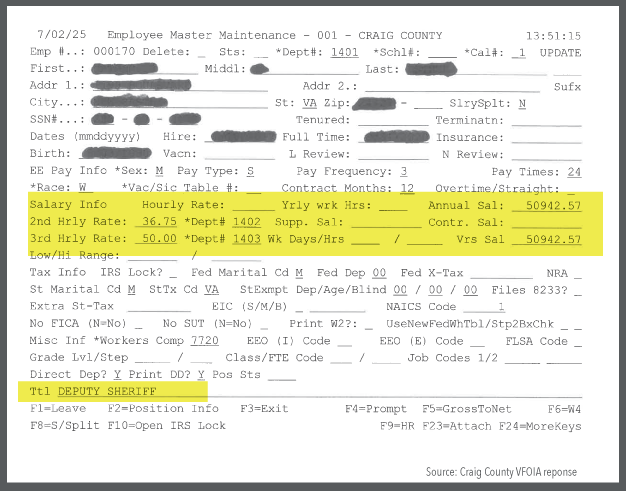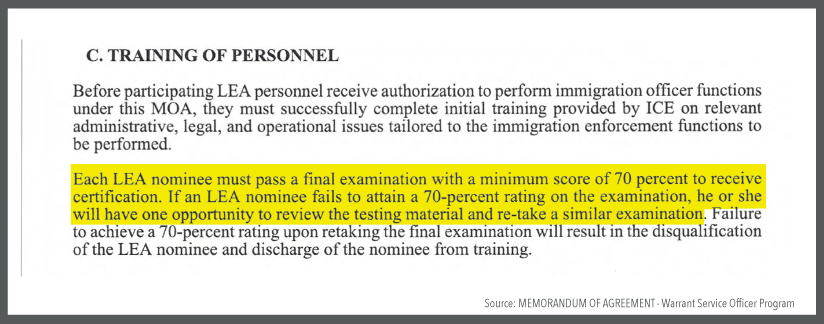In Virginia and throughout the United States, there has been an increase in local law enforcement choosing to spend time and resources to support, or even act, as federal immigration and customs enforcement (ICE) agents. This can take many forms, from voluntarily detaining a person longer than necessary to allow ICE to become involved to formal agreements that enable local law enforcement agencies to perform many of the duties of an ICE officer, including arresting people based on their immigration status.
LAJC has been researching these formal agreements—called “287g agreements” after the section of the Immigration and Nationality Act (INA) that allows them—and sent dozens of Virginia Freedom of Information Act (VFOIA) requests to local sheriff’s departments and state law enforcement agencies across Virginia. We found a significant (and still growing) number of local agencies that are deviating from their stated missions, committing resources and assuming risk in support of an effort that terrorizes our immigrant neighbors.
Below, you can learn more about what 287g agreements are, where they are currently in place in Virginia, and what we have learned from our research. You can also access many of the source documents we obtained through our VFOIA requests.
What is 287(g)
The 287(g) program, enables U.S. Immigration and Customs Enforcement (ICE) to delegate to state and local agencies, usually law enforcement, the authority to act as independent federal immigration officers in certain circumstances, with limited oversight by ICE. This is one of the ways that these agencies voluntarily agree to work with ICE.
This model allows specifically designated officers of state and local law enforcement to identify immigrants held in prisons and local jails, interrogate them about their immigration status, place them into removal proceedings, detain them beyond their release date, transport them to immigration detention, and other things. This can mean that people who have not been proven guilty of any crime are held past their release and likely face deportation.
This model effectively means that your neighborhood police officer or state trooper must now also be an ICE agent, instead of focusing solely on public safety and enforcing state and local laws. Officers with little experience (as little as two years on the force) and the equivalent of just one week of training are expected to apply immigration laws in their everyday interactions.
Early versions of this model were so rife with issues, including serious civil rights abuses, that President Obama ended it. The task force model was not used during the Trump administration’s first term and is only coming back to use now.
This model allows state and local law enforcement to serve ICE administrative warrants in their agency’s jail. This means that when a person held in a local jail is targeted by ICE, local police can detain them after their release, and request they be held longer, to put them in removal proceedings.
Where are 287(g) agreements in place in Virginia?
Explore the map below to see what counties and government agencies currently have agreements or have pending agreements.
map last updated 9/25/25 – Click the icon on the top left to see key and other information
287(g) agreements are bad for everyone
287(g) agreements increase fear in our communities while redirecting limited taxpayer dollars away from their intended purpose and exposing localities to significant liability. While 287(g) agreements are not the only way local law enforcement can collaborate with ICE, they formalize this relationship and give designated but minimally trained officers the ability to act without significant oversight.
Fear
When people in Virginia fear any interaction with law enforcement due to their immigration status, it harms both those families and the broader community. It can mean families don’t seek out needed services, don’t report crimes witnessed or crimes they have experiences as victims to police, and limit their participation in their communities. It makes us all less safe and less productive.

Email from Grayson County Sheriff seeking to enact at 287g agreement and acknowledging that he is planning to target the immigrant workers that provide essential labor to a major economic industry.
Cost
287(g) agreements are not free; they shift taxpayer-funded resources that are intended to protect communities towards instead terrorizing them. History has shown in localities across the country that the cost of 287(g) agreements can lead to significant financial shortfalls. Not only that, immigrant communities are proven to be an economic positive for localities with their contribution in both spending and tax revenue. When 287(g) enforcement threatens immigrant communities, it means also decreased economic activity for those localities.
Our analysis of the VFOIA responses from just 14 localities and state law enforcement agencies shows that an estimated $200,000 of agency funds are currently committed just to training officers to participate in 287(g) agreements*. That amount doesn’t include the cost of current or future work hours that should have been spent on their regular duties.
*estimate based on salary data provided by VFOIA responses or from other publicly available sources (hiring advertisements, etc.) and training time requirements posted on ICE.gov

Information on nominated officer provided to ICE
Training
Officers who participate in 287(g) agreements receive shockingly little training in how to enforce immigration laws. ICE states on its promotional flyer for one of the 287(g) models that officers “…complete a 40 hour online course covering, among other things, scope of authority, immigration law, civil rights law, cross-cultural issues, liability issues, complaint procedures, and obligations under federal law.” One week of online training could only scratch the surface of immigration law alone, which is of one of the most complex areas of law. Not only that, but officers only need to get a “C” on the final exam.

Liability
The lack of training on our complex immigration system and vital civil rights laws leaves 287(g) localities in a very risky place. In most agreements, the federal government offers no guarantee of support should an officer be caught violating the law in attempting to detain a community member for ICE. This leaves local governments at risk of lawsuits, costing taxpayers even more.

From the section on liability from the MOU between ICE and Allegheny County
This is just part of the picture
While the VFOIA requests made by LAJC’s shed some light on how local and state law enforcement agencies are entering into formal collaboration with ICE, a number of our requests were denied.
In those cases, the localities often incorrectly claimed that ICE could prohibit the release of communications between ICE and the law enforcement agency, which 287(g) agreements purport to do, rather than comply with Virginia’s FOIA law by releasing all responsive documents in the localities’ possession not protected by FOIA.
While we are working to educate those who were not fully responsive on what Virginia’s FOIA law encompasses, this is just another example of how ICE is hiding its activities from public scrutiny.
Mecklenburg
Pittsylvania
Richmond
Scott
Shenandoah
Smyth
Washington
Southwest Regional Jail Authority
Virginia Marine Resources Commission
Virginia Department of Wildlife Resources
We want to hear from you
We want to hear from you
Did you, or someone you know, experience an immigration- related incident in Virginia with your local or state police? We are collecting stories and information to better understand how 287(g) agreements are working in Virginia, and to push back against local collaboration with ICE.
Your story
*Filling out this form does not mean that LAJC will represent you in any legal issue. While we can’t reply to everyone who fills out this form, we may reach out for more information on your issue. We will never share your name or contact information with any other party. By filling out the form, you agree to allow us to use aspects of your story in our advocacy, including on digital and print advocacy materials.

